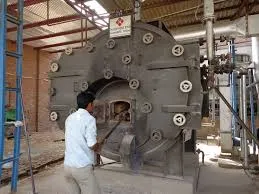
ກ.ຍ. . 25, 2024 04:57 Back to list
Understanding the Function and Benefits of a Hot Water Boiler System
What is a Hot Water Boiler?
A hot water boiler is a crucial component in many heating systems, commonly utilized in residential, commercial, and industrial settings. It serves the primary purpose of heating water, which can then be circulated through pipes to provide warmth and hot water for various applications. Understanding how a hot water boiler works, its components, and its benefits can help homeowners and businesses make informed decisions regarding their heating needs.
Working Principle
The fundamental principle behind a hot water boiler is quite simple. Water is heated in a closed system, allowing it to circulate through radiators, baseboard heaters, or underfloor heating systems. The boiler heats water either through combustion of a fuel source—such as natural gas, oil, or propane—or through electrical resistance. Once heated, the hot water is pumped through pipes to the designated areas, where it radiates heat to the surrounding environment.
Components of a Hot Water Boiler
A typical hot water boiler system consists of several key components
1. Boiler Unit This is the core of the system where water is heated. It includes a combustion chamber, heat exchanger, and various controls to regulate temperature and pressure.
2. Heat Exchanger The heat exchanger is responsible for transferring heat from the fuel source to the water. This is often achieved through copper or steel pipes that allow water to flow while absorbing heat.
3. Pump A pump circulates the hot water through the heating system, ensuring consistent distribution to radiators or heating elements.
what is a hot water boiler

5. Controls and Thermostats Modern hot water boilers are equipped with advanced controls that optimize performance and efficiency. These can include programmable thermostats that allow users to set specific heating schedules, as well as safety mechanisms to prevent overheating and system failures.
Benefits of Hot Water Boilers
Hot water boilers offer several advantages, making them an attractive choice for heating
- Energy Efficiency Compared to traditional heating systems, modern hot water boilers are designed for high efficiency, reducing energy consumption and lowering utility bills.
- Comfort Hot water heating systems provide consistent and even heat distribution, creating a comfortable indoor environment. Unlike forced-air systems, which can create drafts, hot water radiators emit a gentle warmth.
- Longevity A properly maintained hot water boiler can last for many years, making it a long-term investment for property owners. Regular maintenance can extend its lifespan and enhance performance.
- Versatility Hot water boilers can serve multiple purposes, including supplying hot water for domestic use, such as showers and dishwashing, in addition to heating spaces.
Conclusion
In summary, hot water boilers play a vital role in providing heating and hot water for various applications. Their efficient operation, combined with the comfort they offer, makes them a popular choice among homeowners and businesses. By understanding the mechanics behind hot water boilers and their components, users can make informed decisions to optimize their heating solutions. Whether considering a new installation or upgrading an existing system, a hot water boiler can deliver reliability and efficiency for years to come.
-
Best Steam Boiler Design PDF Free Design Calculation & Diagram Downloads
NewsJun.10,2025
-
Hot Boiler Water Heater Efficient Heating Solutions for Home & Commercial Use
NewsJun.10,2025
-
Steam Boiler Safety Devices High-Quality Protection Valves
NewsJun.10,2025
-
Ultimate Steam Boiler Checklist for Safety & Efficiency
NewsJun.10,2025
-
Optimal Hot Water Boiler Temperature Setting Guide
NewsJun.10,2025
-
Effective Hot Water Boiler Chemical Treatment Protect & Maintain
NewsJun.09,2025
Related PRODUCTS






















